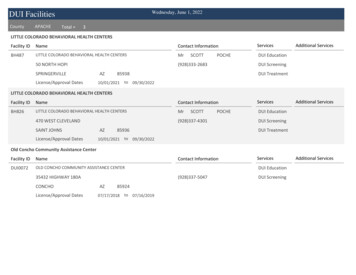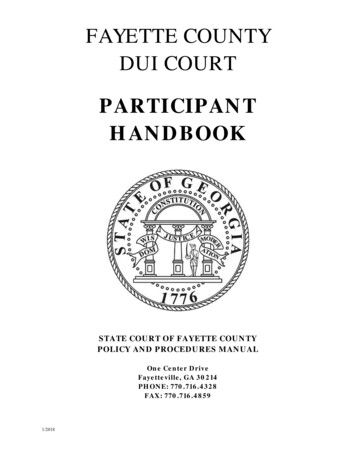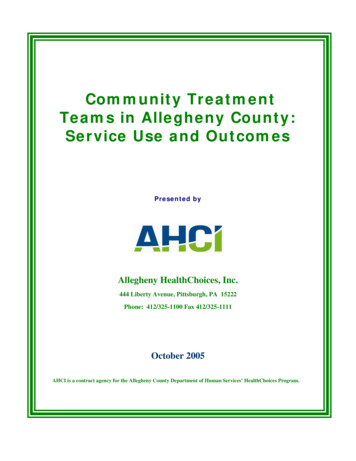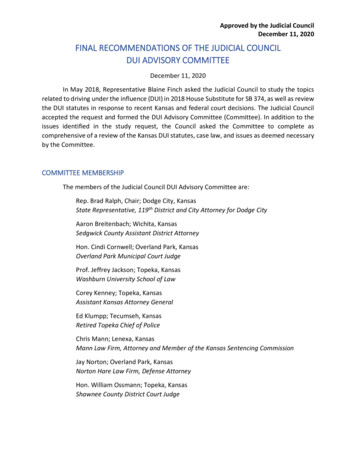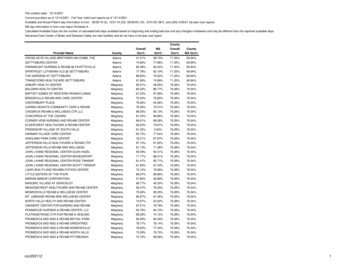
Transcription
Narrative ReportAllegheny CountyDUI Alternative to Jail ProgramSystem Collaboration Leads to Innovative ReformPREPARED BYJohn SawyerJanuary 2013The Allegheny CountyDepartment of Human ServicesOne Smithfield StreetPittsburgh, Pennsylvania s/dhsPHONEFAX
Crime and Justice Allegheny County DUI Alternative to Jail Program January 2013page2Rachel Evans’ son ran away from home one day during thesummer of 2011. The East Pittsburgh resident and mother of sixhad been drinking and smoking marijuana earlier in the day, andin the moment, she panicked: The need to look for her son wasmore important than the fact that she was likely too intoxicatedto get behind the wheel of a car. While driving through herneighborhood, Evans fell asleep, her car veered off the road, andshe was arrested for Driving Under the Influence (DUI). No onewas hurt, and her son was soon found, but she was convicted ofthe offense in her subsequent court appearance and anticipatedthat she would spend some time in jail.Eight months later, on a Saturday afternoon in March, Evans is serving her sentence alongwith approximately 20 other first-time DUI offenders. But she is not in jail. Instead, she is in anondescript conference room at a hotel in Pittsburgh’s Oakland neighborhood. The group is inthe third of four intensive days of classes, therapy and other programming that make up theAllegheny County DUI Alternative to Jail Program, better known to facilitators and participantsas the “DUI Hotel.”Evans no longer uses marijuana and has been a regular at Alcoholics Anonymous meetings.She is unemployed, and with the help of Allegheny County court and probation office staff, hasdeveloped a plan to pay the fees required to participate in the DUI Hotel. The journey has beena bumpy one, but, when asked, she speaks enthusiastically about the DUI Hotel program.“I first heard about the program at court, and it sounded like baloney to me. I thought we’dget locked up in a hotel, confined to our rooms with our phones taken away,” Evans says.“I was wrong. The education has been well worth it. They give you valuable information — legalinformation, stuff about blood alcohol levels. I’ve found common ground with the other peoplein the group, talking about our kids. The facilitators have been caring and efficient, keepingthe group in line. It beats going to jail, hands down.” www.alleghenycounty.us/dhs The Allegheny County Department of Human Services
Crime and Justice Allegheny County DUI Alternative to Jail Program January 2013page3Evans and the other participants will not be finished with the program until they leave the hotelthe following evening. But when they do, their sentences will be completed. What’s more, thesentences will have been carried out at no cost to taxpayers.***In 2008 and 2009, Allegheny County was facing a distinct problem: Processing a high numberof DUI arrests and convictions was creating major administrative and logistical challenges withinan already overburdened criminal justice system.The solution — arrived at after more than a year of research, program design and collaborationacross departments — was the launch in late 2010 of the DUI Hotel. The new program wasdesigned to reduce the number of first-time DUI offenders sentenced to the Allegheny CountyJail (ACJ) or to electronic monitoring (EM), to improve compliance with sentencing requirements,and to reduce overall recidivism of DUI offenders across the county.“The advantage of the DUI Alternative to Jail Program is that it comes at the defendant ‘full-bore’ rather than over a period of months,” says Judge Jeffrey Manning, Administrative Judge of theCriminal Division of the Court of Common Pleas of Allegheny County.The idea behind the DUI hotel concept is “It all comes in one package. The quicker you can put everythingthat the system can improve the success ratetogether, the better it is for the system and the defendant.”of its interventions, reduce administrativeburden, and reduce overall cost by givingfirst-time offenders the option to completeall of their required penalties over the courseof one very intensive four-day program.The idea behind the DUI Hotel concept is just that: that the systemcan improve the success rate of its interventions, reduce administrativeburden, and reduce overall cost by giving first-time offenders theoption to complete all of their required penalties over the course ofone very intensive four-day program.BACKGROUNDPennsylvania law carries a mandatory minimum sentencing requirement for all DUI convictions.In most cases, a first-time conviction for DUI requires several days of jail time or, as an alternativeavailable under the state’s Intermediate Punishment (IP) statute, house arrest with electronicmonitoring (EM). In addition, offenders must pay a fine, forfeit their driver’s license for one year,complete Alcohol Highway Safety School (AHSS) DUI classes, and submit to drug and alcoholscreening and related treatment as directed by the court.Beginning in 2009, the Allegheny County Courts began implementation of “Phoenix Court,”a case docket management program intended to streamline processing of certain types ofcases. The Phoenix Court program was successful in expediting these cases, and DUI convictionsfactored heavily into the cases being processed much more quickly through the court system.The increase in the pace of DUI convictions resulting from Phoenix’s success had one unintendedconsequence, however: The system for providing EM for DUI defendants quickly becameoverburdened. www.alleghenycounty.us/dhs The Allegheny County Department of Human Services
Crime and Justice Allegheny County DUI Alternative to Jail Program January 2013page4“The amount of resources that have to be expended to put somebody on house arrest for threedays is tremendous,” says Judge Beth Lazzara, one of two Allegheny County judges who initiallyoversaw the Phoenix Court docket. “When [Judge] Tom Flaherty and I started doing Phoenix,we started moving cases much faster. Each of us did 2,500 cases the first year of Phoenix, thevast majority of those being DUIs. They went from having not much of a backlog on house arrestbracelets to a tremendous backlog. There was, at one point, an almost 1,000-person backlog.”Recognizing that overburdened resources were beginning to impede Allegheny County’s abilityto intervene effectively in DUI cases, a group of officials from the court’s Pre-Trial and ProbationDepartments began to look for a better way.“We were looking for a way to divert those cases from EM — and the jail — into somethingthat made more sense for the DUIs as far as looking at getting their sentence completed andtreatment at the same time,” says Janice Dean, Director of Pre-Trial Services for the FifthJudicial District of Pennsylvania, which is comprised of Allegheny County.Beyond the overburdened system for EM, the requirement that offenders complete a wide arrayof other interventions was creating another administrative challenge: High numbers of offenderswere not completing the requirements, resulting in a return to court for probation violations.“Most of our probation violations in first-time DUIs are people not completing Alcohol HighwaySafety Classes. So [the DUI Hotel] eliminates from the system not only trying to get themhooked up on the bracelet, but it also eliminates, down the road, the probation violations,”says Lazzara.She continues, “From the participants’ perspective, instead of trying to get AHSS DUI classesin when you don’t have a license, and you have to get somebody to drive you to the place, andit takes you eight, 10, 12 weeks to get that done, you can get it all done in that four days.”Beyond the practical goal of reducing administrative burden, the hope is that the concentratedapproach to DUI intervention and treatment will prove to be a more effective treatment model,which will in turn lead to better outcomes.“I believe that those of us who work in the criminal justice system have always sensed that when you deal with people with substance abuse and mental health problems, you need to givethem the opportunity to rehabilitate themselves,” says Judge Manning.AN INNOVATIVE SOLUTIONThe initial idea for the DUI Hotel came from a similar, smaller-scale program operating in PortageCounty, Ohio. When the problem of DUI convictions and the EM backlog was raised, BrianDunbar and Jim Trozzi from the Adult Probation Department went to Ohio to see whether asimilar program could work in Allegheny County. www.alleghenycounty.us/dhs The Allegheny County Department of Human Services
Crime and Justice Allegheny County DUI Alternative to Jail Program January 2013page5While the Ohio program has some key differences — it is privately run, much smaller, andoperates according to a curriculum designed to meet Ohio’s statutory requirements — the groupsaw potential in the model. They began the process to develop a similar program locally.“We held a series of meetings with our stakeholders, including the different Regional AlcoholProviders, district attorney, judges, all the people who would have to have a hand in it,” saysDunbar. “From the beginning, I was pleasantly surprised at how willing all of our stakeholderswere to do this.”The DUI Hotel program currently takes place at one of two hotels in the Pittsburgh region.Selecting the right hotels was a crucial part of the process, according to Dean.“The hotel search was tricky, because it’s hard to find a hotel without a bar,” she says. “Oncewe found a few hotels that didn’t have a bar, we started talking to the general managers to seewho was interested, and a lot of them just weren’t.“The first hotel that showed an interest in participating is located about 20 minutes fromdowntown Pittsburgh. The group met with the hotel’s staff and corporate office, explained theconcept, and eventually entered into a contract outlining the hotel’s role in the program.“They saw it as potential steady business — two times a month, 30 rooms that they were goingto know they could count on renting,” Dean says.In addition to finding the right hotels and vendors (e.g., food and security), the group metwith Allegheny County’s four Regional Alcohol Providers (RAPs) to discuss the idea and itsimplementation. The program represented a significant shift in how these providers deliverservices, including requiring staff to work weekends, so their cooperation was essential.“From [the RAPs’] perspective, instead of facilitating a group over the course of six weeks,it gave them an opportunity to get people through the program in a weekend,” says Dunbar.Betty McBride, of Mon-Yough Community Services, which has been providing DUI substanceabuse treatment services in Allegheny County for over 30 years, helped lead the group thatdeveloped the hotel-specific approach to programming. She thinks the program will besuccessful because of the collaborative relationship from which“In Allegheny County, the legal and healthit developed.systems — in our DUI programs — have a wonderful“I think one of the biggest factors that will make it a success [isthis]: You have the legal system, and you have the health system.what helps it be so successful.”[F]or this to be successful, you need the legal–health systemapproach. We need to marry the two. Not all counties are like that. In Allegheny County, the legaland health systems — in our DUI programs — have a wonderful connection and communication,and I think that’s what helps it be so successful.”connection and communication, and I think that’s www.alleghenycounty.us/dhs The Allegheny County Department of Human Services
Crime and Justice Allegheny County DUI Alternative to Jail Program January 2013page6HOW IT WORKSIn Allegheny County, first-time DUI offenders are divided into three tiers, depending on factorssuch as blood alcohol content at the time of arrest. The lowest tier of offense carries a sentenceof probation only, while the middle and highest tiers require 48 and 72 hours in jail, respectively.Because of Pennsylvania’s IP statutes, these sentences may be carried out in alternative housing.Previously, it was under this IP option that offenders were sentenced to house arrest with EM.Under the old system, people sentenced to three days of electronic monitoring were no closerto fulfilling their treatment requirements at the end of the EM period than when they started it,”says Dunbar. “At the end of the DUI Hotel program, offenders are entirely done with theirtreatment requirements.”Today, first-time Tier 2 or Tier 3 DUI offenders are sentenced either to jail or to the DUI Hotel.This is the result of cooperation between the District Attorney’s office, which eliminated theoption of home monitoring, and the trial courts, whose judges have embraced the DUI Hotelas the best alternative to a jail sentence.Electronic monitoring is no longer part of our offer at all for first-offense DUIs,” says DeputyDistrict Attorney Rebecca Spangler. “We offer two options: they can complete the DUI Alternativeto Jail program or they can go to jail. And it’s my understanding that, generally, the courts aresentencing that way now for first-time offenders.”After sentencing, offenders have 90 days to pay the required fee, complete the requiredpre-hotel programming (e.g., license forfeiture, payment of fines, attendance at AA meetings)and enter the hotel on the weekend assigned by the courts. Each participant pays 500 for thefull Thursday-to-Sunday program, including a shared hotel room, food, classes and incidentalcosts. For an additional cost of 350 ( 850 total), participants may elect to have a private room.Participants enter the hotel on Thursday night and undergo a check-in process involving aBreathalyzer test; this is the first of several blood alcohol level checks throughout the weekend.Additionally, during check-in, program administrators inspect participants’ luggage, as alcoholand non-prescription drugs are strictly prohibited. Those who did not pay for a private roomare paired with a roommate. The first night concludes with a group dinner and introduction tothe program.For the next three days, offenders participate in an intensive curriculum. As required underDUI sentencing guidelines, sessions are divided between AAHS DUI classes and group therapy.This programming is facilitated by one of four RAPs — Western Psychiatric Institute and Clinic(WPIC), Mon-Yough Community Services, Alternatives and Mercy Behavioral Health. Each ofthese providers has historically provided these services to DUI offenders — before the advent ofthe DUI Hotel, participants were required to attend classes at the provider location. When thehotel program was introduced, the providers collaborated to tailor a curriculum to the newintensive and concentrated time frame. www.alleghenycounty.us/dhs The Allegheny County Department of Human Services
Crime and Justice Allegheny County DUI Alternative to Jail Program January 2013page7McBride, who oversees the DUI and underage drinking programming for Mon-Yough CommunityServices, coordinated the group, representing all four providers that developed the curriculumspecific to the concentrated time frame at the hotel. She hopes that the program will result inoutcomes that are more effective for participants.“It’s all in how it’s presented,” says McBride, speaking of the intensive curriculum. “But havingparticipated in the hotel, I can say that the folks who are there are really exploring what theyneed to be exploring, and they work really hard. Outcomes studies“Outcomes studies need to be done, but I thinkneed to be done, but I think it’s going to prove to be quite successful.”it’s going to prove to be quite successful.”Alcohol Highway Safety School classes are designed to educateparticipants on the implications of driving while intoxicated — including the safety, legal, physicaland economic ramifications of that decision. The goals for the participants include: acquiring the knowledge necessary for understanding the relationship between substanceuse and highway safety recognizing that driving, after using substances, is dangerous and inappropriate behavior recognizing the broader implications of a DUI arrest in relation to family, job and friends identifying realistic strategies to avoid future DUI behavior learning how and where to obtain help for substance abuse problemsIn one exercise, participants complete a worksheet assessing the total cost (not only fines andprogram fees, but also medical, court, time and other related costs) of their DUI. Estimatesranged from the low five-figures to the mid six-figures, the latter involving hospital costs frominjuries sustained during a DUI-related accident.One participant described how the exercise struck a chord with him when he realized the truecost of his offense. “I’m going to take this paper with me next time I’m out drinking, becauseI’m not paying a thousand dollars for a gin and tonic,” he remarked.Much of the remaining time over the course of the weekend is spent in group therapy sessions,which, according to McBride, blend two empirically-based techniques (Stages of Change andCognitive Behavioral Therapy) to encourage participants to examine their behavior.“Basically, it is taking a look at flawed thinking patterns and how they affect behavior. Whenyou explore and break down the thinking and make changes accordingly, this is then followedby positive behavioral changes.”For Rachel Evans, the group therapy sessions were part of what she found most helpful aboutthe hotel: “For me, it’s kind of like with AA — it’s the kind of thing that helps me get through,moment by moment.” www.alleghenycounty.us/dhs The Allegheny County Department of Human Services
Crime and Justice Allegheny County DUI Alternative to Jail Program January 2013page8CHALLENGESThe group responsible for the implementation of the DUI Hotel faced several challenges:logistics, cost and clarifying misconceptions about the program.Logistically, implementation presented challenges related to the complexities of coordinatinga new process, involving stakeholders from across the criminal justice and human servicesystems in Allegheny County, while at the same time bringing in new partners, including thehotels themselves. Additionally, the implementation group knew that to generate support andensure program sustainability it was important to be able to support the program withoutgovernment funding.“When we decided to move forward on this, we were committed to the idea that it had tobe self-sustaining,” says Dunbar. “Anything that would get off the ground had to be fundedby offenders.”While creating a self-sustaining program was essential, the group was concerned that thehigh cost of the program could be a deterrent for offenders with limited resources.“When you have someone who’s represented by a public defender, and that public defendersees that it’s going to cost 500 to attend the Hotel, they say, ‘Whoa, we’re not going to dothis,’ ” says Chris Shanley of the Pre-Trial Division, who supervises the Alcohol Highway SafetyProgram for the county. “But if we can educate the defense bar and the public defendersabout the true cost of going onto house arrest, they’ll see that it’s still cheaper in the long runto do it this way.”With the help of the judges, the DUI Hotel team made the case directly to defendants andattorneys, demonstrating that the cost of the DUI Hotel was essentially the same as theRestrictive Intermediate Punishment option requiring EM. In fact, the hotel often emerged asthe less expensive option because, under the old system, many offenders needed to have ahome phone line installed to which the EM equipment must be connected.“The big problem for people on house arrest is that most people don’t have home phones.So when you add in that cost, which is at least a 100 hookup fee for the phone line, it’s actuallycheaper to go through the DUI Hotel,” says Judge Lazzara.The courts also make special efforts to work with offenders; one strategy is to delay sentencingto afford them more time to come up with the program fees.In order to challenge misconceptions about the program, the team focused on explaining theprogram and convincing stakeholders and participants of its value as an alternative. Beyond thejudges, attorneys, offenders and system partners, the group felt that it was crucial to educatethe public about the program. www.alleghenycounty.us/dhs The Allegheny County Department of Human Services
Crime and Justice Allegheny County DUI Alternative to Jail Program January 2013page“The idea of sending people to a hotel to serve an intermediate punishment sentence at firstblush can be distasteful to some people — ‘They committed a crime. Why do they get to goto a hotel?’ ” says Dunbar.However, support has steadily increased since the benefits of the consolidated approach havebeen demonstrated, particularly because it comes at no additional cost to the taxpayer.OUTCOMESWhen the idea was conceived, it had several clear — and complementary — goals: The main catalyst for creation of the program was the need to reduce the administrativebacklog being created by use of probation’s EM system. By creating a self-sustaining alternative to jail other than house arrest/EM, the programsought to reduce overall costs to the system. The program was designed to simplify offenders’ ability to complete the required activitiesand interventions for a first-time DUI offense and, as a result, reduce the number of DUIoffenders returning to court for probation violations. The program’s overarching goal is to reduce the number of first-time DUI offendersreturning for second and third offenses — in other words, to reduce the DUI recidivism rate,which is among the highest for all crimes.Progress is being made in reducing the EM backlog, costs and returns to court forprobation violations. According to Steve Esswein, Supervisor of the Adult Probation House Arrest Program,at its worst, the EM backlog constituted a waiting list of from 900 to 1,000 people. In manycases, offenders would receive a sentence, and then it would take several months beforethe equipment was available to have them banded for house arrest. Today, there is nobacklog in EM, and offenders (convicted to house arrest for crimes other than a DUI) arebanded within two to three weeks. The DUI Hotel program is saving Allegheny County taxpayers significant resources byreducing the number of offenders sent to jail. According to Chris Shanley of the Pre-TrialDivision, the average cost of housing an inmate in the Allegheny County Jail is 65.00 perday. The county has avoided paying for jail time for 1,105 offenders since the programbegan, which, because the DUI Hotel is self-funded, has generated an estimated costsavings of 287,300 since the program began in October of 2010. A third anticipated benefit of the program is a reduction in the number of offendersreturning to court for probation violations resulting from non-compliance with sentencingrequirements. Because the programming offered at the hotel is comprehensive andconsolidated, it is hypothesized that participants will be far less likely to violate the termsof their probation. Data on this measure are currently being collected. www.alleghenycounty.us/dhs The Allegheny County Department of Human Services9
Crime and Justice Allegheny County DUI Alternative to Jail Program January 2013 page10As the number of DUI Hotel participants who have completed the program continues toincrease, the County is analyzing data related to recidivism. A snapshot of data from early2012 offered reason for optimism — of the 449 participants who had completed the programat the time, only eight DUI offenders had been re-arrested, and only two of these foranother DUI. More in-depth analysis is planned.CONCLUSIONThe Allegheny County DUI Alternative to Jail Program represents a collaboration designed tomake the criminal justice system function more efficiently, while maintaining accountabilityfor offenders, improving upon an already high standard of quality, and delivering increasedvalue to the County’s taxpayers. The program has been scaling up since its inception with thecooperation of all of the interested parties — so far in 2012, 779 offenders have successfullycompleted the program, as compared to 299 in 2011 and 27 in 2010. so far in 2012, 779 offenders haveIt is now the default sentencing option for first-time DUI offenders.successfully completed the program, asWhile longer-term analysis is needed to show the impact of theprogram on recidivism, early results indicate that the DUI Hotel programIt is now the default sentencing optionis achieving the underlying goal of increased public safety throughfor first-time DUI offenders.reduced repeat-DUI offenses. The group in charge of the DUI Hotelis examining options to build on this success with similar interventions — alternatives to jailinvolving more concentrated treatment components — for higher-level DUI offenses.compared to 299 in 2011 and 27 in 2010. www.alleghenycounty.us/dhs The Allegheny County Department of Human Services
Allegheny County DUI Alternative to Jail Program PREPARED BY John Sawyer January 2013 The Allegheny County Department of Human Services One Smithfield Street Pittsburgh, Pennsylvania 15222 PHONE412.350.5701 FAX412.350.4004 www.alleghenycounty.us/dhs Narrative Report Allegheny County DUIAlternative to Jail Program
